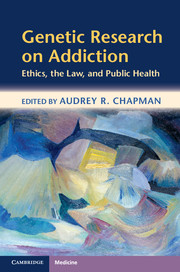Book contents
- Frontmatter
- Contents
- Contributors
- Preface
- Section 1 Introduction
- Section 2 Research ethics
- 4 Improving the informed consent process in research with substance-abusing participants
- 5 Ethical considerations in genetic research with children affected by parental substance abuse
- 6 Protecting privacy in genetic research on alcohol dependence and other addictions
- 7 Certificates of Confidentiality: Uses and limitations as protection for genetic research on addiction
- 8 Ethical issues in human genomic databases in addiction research
- 9 Should addiction researchers accept funding derived from the profits of addictive consumptions?
- 10 Ethical issues related to receiving research funding from the alcohol industry and other commercial interests
- Section 3 Translating addiction research
- Section 4 Conclusions
- Index
- References
10 - Ethical issues related to receiving research funding from the alcohol industry and other commercial interests
from Section 2 - Research ethics
Published online by Cambridge University Press: 05 September 2012
- Frontmatter
- Contents
- Contributors
- Preface
- Section 1 Introduction
- Section 2 Research ethics
- 4 Improving the informed consent process in research with substance-abusing participants
- 5 Ethical considerations in genetic research with children affected by parental substance abuse
- 6 Protecting privacy in genetic research on alcohol dependence and other addictions
- 7 Certificates of Confidentiality: Uses and limitations as protection for genetic research on addiction
- 8 Ethical issues in human genomic databases in addiction research
- 9 Should addiction researchers accept funding derived from the profits of addictive consumptions?
- 10 Ethical issues related to receiving research funding from the alcohol industry and other commercial interests
- Section 3 Translating addiction research
- Section 4 Conclusions
- Index
- References
Summary
Introduction
Using terms of justification such as “corporate social responsibility” and “partnerships with the public health community,” the alcohol, tobacco, and gambling industries (mainly large producers, trade associations, interest groups, and social aspects organizations) fund a variety of scientific activities that involve addiction scientists or overlap with their work. In addition, the pharmaceutical industry funds clinical trials and supports other activities related to scientific research, such as the preparation of manuscripts and the sponsorship of lectures by speakers who investigate their products. The aim of this chapter is to evaluate the ethical challenges that have emerged from industry involvement in addiction science, particularly in relation to genetic research.
At the center of the ethical challenges are issues of trust, credibility, and conflict of interest. Trust in the addiction research world can be affected when commercial interests are perceived to outweigh health considerations. The credibility of scientific findings may be affected when evidence emerges that industry-sponsored research is flawed, biased, or methodologically weak. Conflict of interest is a situation in which the researcher has a personal or financial interest that may be put above the integrity of the research being conducted. After reviewing the extent of industry involvement in addiction research, we discuss the moral hazards of research funding from commercial interests, and offer ways in which individual investigators as well as professional organizations can work to minimize these risks.
- Type
- Chapter
- Information
- Genetic Research on AddictionEthics, the Law, and Public Health, pp. 139 - 154Publisher: Cambridge University PressPrint publication year: 2012
References
- 1
- Cited by



